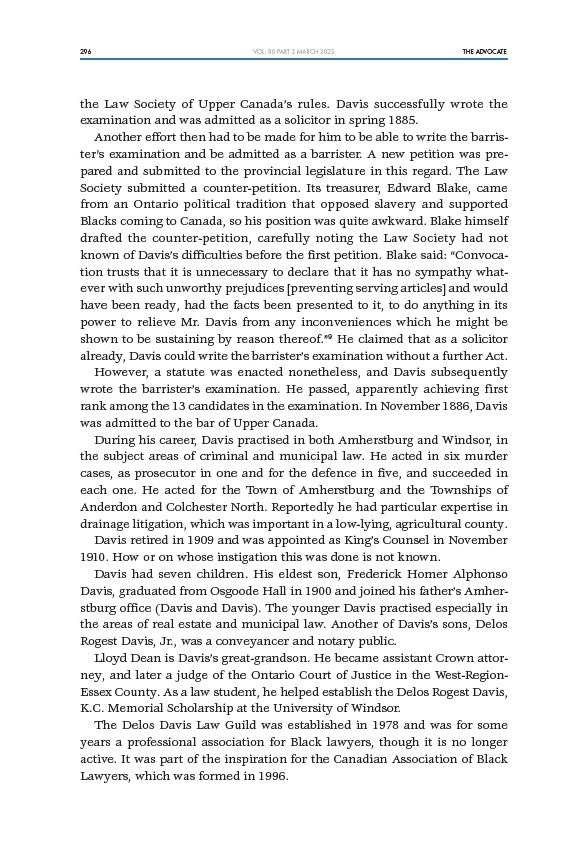
296 THE ADVOCATE
VOL. 80 PART 2 MARCH 2022
the Law Society of Upper Canada’s rules. Davis successfully wrote the
examination and was admitted as a solicitor in spring 1885.
Another effort then had to be made for him to be able to write the barrister’s
examination and be admitted as a barrister. A new petition was prepared
and submitted to the provincial legislature in this regard. The Law
Society submitted a counter-petition. Its treasurer, Edward Blake, came
from an Ontario political tradition that opposed slavery and supported
Blacks coming to Canada, so his position was quite awkward. Blake himself
drafted the counter-petition, carefully noting the Law Society had not
known of Davis’s difficulties before the first petition. Blake said: “Convocation
trusts that it is unnecessary to declare that it has no sympathy whatever
with such unworthy prejudices preventing serving articles and would
have been ready, had the facts been presented to it, to do anything in its
power to relieve Mr. Davis from any inconveniences which he might be
shown to be sustaining by reason thereof.”9 He claimed that as a solicitor
already, Davis could write the barrister’s examination without a further Act.
However, a statute was enacted nonetheless, and Davis subsequently
wrote the barrister’s examination. He passed, apparently achieving first
rank among the 13 candidates in the examination. In November 1886, Davis
was admitted to the bar of Upper Canada.
During his career, Davis practised in both Amherstburg and Windsor, in
the subject areas of criminal and municipal law. He acted in six murder
cases, as prosecutor in one and for the defence in five, and succeeded in
each one. He acted for the Town of Amherstburg and the Townships of
Anderdon and Colchester North. Reportedly he had particular expertise in
drainage litigation, which was important in a low-lying, agricultural county.
Davis retired in 1909 and was appointed as King’s Counsel in November
1910. How or on whose instigation this was done is not known.
Davis had seven children. His eldest son, Frederick Homer Alphonso
Davis, graduated from Osgoode Hall in 1900 and joined his father’s Amherstburg
office (Davis and Davis). The younger Davis practised especially in
the areas of real estate and municipal law. Another of Davis’s sons, Delos
Rogest Davis, Jr., was a conveyancer and notary public.
Lloyd Dean is Davis’s great-grandson. He became assistant Crown attorney,
and later a judge of the Ontario Court of Justice in the West-Region-
Essex County. As a law student, he helped establish the Delos Rogest Davis,
K.C. Memorial Scholarship at the University of Windsor.
The Delos Davis Law Guild was established in 1978 and was for some
years a professional association for Black lawyers, though it is no longer
active. It was part of the inspiration for the Canadian Association of Black
Lawyers, which was formed in 1996.